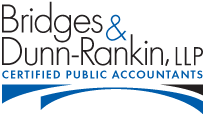Accounting Methods
Kenneth H. Bridges, CPA, PFS July 2001
The accounting methods that you choose for your company can have a significant impact on the amount of income tax that you pay and on the amount of earnings that you report in your financial statements. This article provides an overview of the general accounting method choices that a company has.
Cash Basis
The term “accounting method” includes any procedure that effects the timing of the recognition of revenue or expense. The two basic overall methods are the cash method and the accrual method. Under the cash method, revenue is recognized when cash is received and expenses are recognized when cash is paid. Your taxable income is essentially the same as your net cash flow, with certain exceptions; for example, amounts expended on fixed assets like computers and furniture generally must be capitalized and depreciated over a period of years; amounts received as loans are not included in income, and amounts paid as principal payments on debt are not expenses.
Professional service firms and other service-oriented business which tend to be receivables intensive generally use the cash method of accounting for tax purposes since it usually minimizes the amount of their taxable income. Using the cash method of accounting generally gives you great flexibility to manipulate the amount of your taxable income, since you can defer billing and collection on a significant project near year-end, accelerate payment on your payables, or even prepay certain items to minimize your income, or do just the opposite of these in a year in which you prefer instead to maximize your recognized taxable income.
As you might imagine, the IRS is not very fond of the cash method, and, accordingly, there are a number of limitations on its use. For example, businesses for which the purchase and sale of inventory are a material income-producing factor generally may not use the cash method of accounting, and, generally, C corporations with revenue in excess of $5,000,000 cannot use the cash method of accounting (unless they are a “qualified personal service corporation”) and instead must use the accrual method of accounting.
Accrual Method
If “received” and “paid” are the operative words under the cash method for recognition of revenue and expenses respectively, then “earned” and “incurred” are the operative words under the accrual method. Under the accrual method, the timing of the recognition of your revenue is tied to when you provide services or product to your customers and not when you receive payment. And, likewise, the timing of the recognition of your expenses is tied to when you receive services or product from your vendors and not when you pay them. There is generally perceived to be less ability to manipulate your income under the accrual method than under the cash method.
Adoption and Changes in Method – Generally, a taxpayer is permitted to adopt whichever overall method it chooses on the first tax return that it files. With respect to individual types of revenue and expense, generally you can adopt whatever method you choose the first time that particular type of item occurs. Once you adopt a particular method, you generally must stick with it and be consistent from year to year. IRS consent is generally required to change from one method of accounting to another. However, special procedures have been provided whereby IRS consent is deemed to be automatic for taxpayers who wish to change from the cash method to the accrual method. There is no such automatic consent, however, for attempts to change from the accrual method to the cash method, so generally you will be unable to change to the cash method once you have begun reporting on the accrual method.
Because of this limitation on the ability to change from one method to another, and the limitations described previously on the use of the cash method, it is important before filing your initial tax return to give careful consideration to which method will likely be most beneficial for the long-term, and make your choice accordingly.
Summary – The accounting methods that you choose can have a significant impact on the amount of income that you report for tax and financial statement purposes. For new businesses, it is critical that you carefully analyze your situation and choose the method that is most appropriate for the long-term before filing your initial return. And for existing businesses, it is important that you evaluate your accounting methods each year to determine whether a change is permissible, favorable, or required.
This article is presented for educational and informational purposes only, and is not intended to constitute legal, tax or accounting advice. The article provides only a very general summary of complex rules. For advice on how these rules may apply to your specific situation, contact a professional tax advisor.
Kenneth H. Bridges, CPA, PFS is a partner with Bridges & Dunn-Rankin, LLP an Atlanta-based CPA firm.
This article is presented for educational and informational purposes only, and is not intended to constitute legal, tax or accounting advice. The article provides only a very general summary of complex rules. For advice on how these rules may apply to your specific situation, contact a professional tax advisor.
